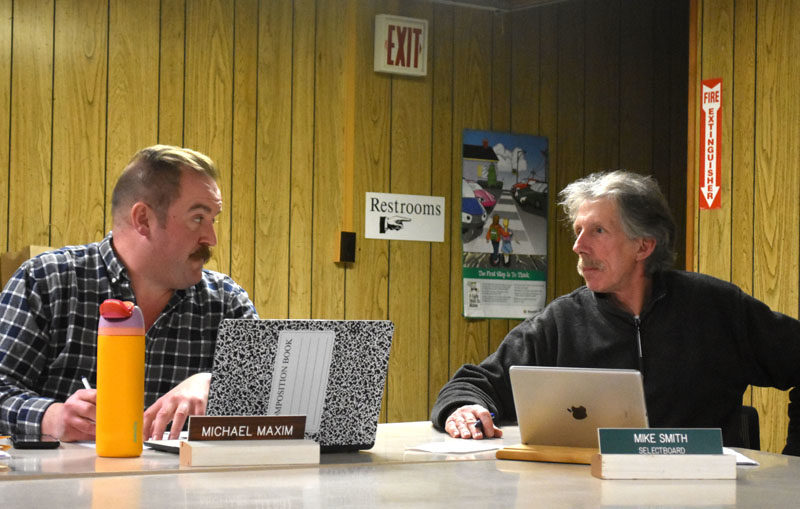
Edgecomb Select Board members Michael Maxim (left) and Mike Smith confer during a board meeting on Tuesday, Feb. 20. The town may become eligible for federal grants from the Land and Water Conservation Fund after 20 years of noncompliance if it determines it can use part of a tax-acquired property to meet equivalency requirements. (Elizabeth Walztoni photo)
Edgecomb is one of several Lincoln County towns long ineligible for federal Land and Water Conservation Fund grants because it sold land where improvements had been made using the fund.
After two decades of noncompliance, the select board may consider using tax-acquired property to come back into good standing, board Chair Mike Smith suggested Tuesday, Feb. 20.
“The door’s open, and for a long time it was totally closed on this,” he said.
The town received $5,853 from the fund in 1974 to construct the tennis court at the former Eddy School. The funds were given with the condition the land always be available for public use. Edgecomb sold the tennis court along with the parcel it sits on to the Eldercare Network in 2004 for $1. The property became the Edgecomb Green.
To be eligible for the grants again, the town would need to provide a new recreation resource for at least equivalent inflation-adjusted value.
Four tax-acquired properties which Edgecomb now owns from the estate of Barry Hathorne could provide an option to resolving the conflict, according to Smith.
The town’s typical policy is to offer tax-acquired properties for repurchase first by the owner, then to abutters, and finally to the general public. Smith said Feb. 20 that the town could retain roughly five acres of one 60-acre parcel and offer the rest for sale following the standard procedure.
Smith suggested the town’s conservation commission review the four parcels from Hathorne’s estate and make a recommendation to the board which to pursue. Alongside the town’s long search for a tennis court equivalent, the commission has looked for public water access opportunities for years.
The parcel also contains a home once belonging to early settler Samuel Trask, which Smith suggested might be offered to the Edgecomb Historical Society as a solution to the society’s ongoing search for a physical headquarters.
If the 60-acre parcel is recommended, Smith suggested it could provide a handicapped accessible parking lot for access to the neighboring Schmid Preserve. Some recreation option would need to be provided, but not necessarily a tennis court, he said.
Smith said he and Schmid Advisory Board Chair Lisa McSwain met with program administrator Doug Beck, who was open to the proposal.
“There’s a lot that’s got to happen,” Smith said, adding he was very appreciative to the state for trying to make the option work.
If the idea moves ahead, the town will have fund two Yellow Book appraisals on the former site and the potential new one to see if they are equivalent in value. The appraisals, which are typically at least several thousand dollars, could be paid for with remaining American Rescue Plan Act funds.
Select Board members Michael Maxim and Lynn Norgang said their fingers were crossed that the suggestion would work out.



